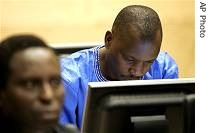In a historic decision, judges at the International Criminal Court are poised to begin hearing their first case. Judges found there was enough evidence against Congolese militia leader Thomas Lubanga to send him to trial for recruiting and using child soldiers to fight his war in the eastern Ituri region of the country. Lauren Comiteau reports from the court in The Hague.
Calling Thomas Lubanga's role essential and his alleged crimes serious and substantial, judges found there was sufficient evidence to make Lubanga the first person tried before the first permanent international court.

Thomas Lubanga (r)in the International Criminal Court in The Hague
Presiding Judge Claude Jorda:
"Mr. Lubanga was at the very least aware that in the ordinary course of events the implementation of the common plan would result in the enlistment, conscription and use of children under the age of 15 in hostilities, that he accepted this," said Judge Claude Jorda.
By common plan, judges mean there was an agreement between Lubanga and other high ranking leaders in the military wing of his Union of Congolese Patriots to use minors to further their war effort. Judges say they systematically trained large numbers of children and sent them to battle. They also used them as body guards, spies, couriers and decoys during the brutal fighting between 2002 and 2003.
Monday's ruling comes after a hearing last autumn when prosecutors presented
Their preliminary evidence. At that time, they cited cases of children as young as 10 being grabbed off the street and sent to Lubanga's camps where they learned how to use guns and were given drugs to calm them down.
Thomas Lubanga, though, denied all charges against him and paints himself as a patriot. His lawyer, Jean Flamme , says it's a hard time for Lubanga who is isolated from all other prisoners except former Liberian President Charles Taylor who is also waiting to be tried in The Hague, but by a different court.
Flamme says he has not had the same amount of resources or time as prosecutors and that it will take him about a year to go to serious defense. But prosecutors say they are satisfied with Monday's decision and look forward to presenting their evidence at trial, which they hope will be later this year.
Related articles
- • UN Security Council Calls on Rwanda to Stop Supporting M23 Rebels in DR Congo (February 22, 2025)
- • 'Deadly environment' plus 'political and social' obstacles hinder Ebola fight, Security Council hears (July 24, 2019)
- • Ebola outbreak declared an international Public Health Emergency (July 17, 2019)
- • Jean-Pierre Bemba named MLC presidential candidate (July 13, 2018)
- • At least 30 dead after massacres in Ituri (March 2, 2018)
- • ICC Confirms 14-Year Sentence Against Thomas Lubanga (December 1, 2014)
- • ICC Case Against Bemba Wrapping Up as Another Opens (November 12, 2014)
- • ICC confirms war crimes charges against Bosco Ntaganda (June 10, 2014)
- • ICC sentences Germain Katanga to 12 years (May 23, 2014)
- • ICC finds Germain Katanga guilty of war crimes and crime against humanity (March 7, 2014)
- • Bosco Ntaganda Attacked Civilians on Ethnic Grounds, ICC Prosecutor Says (February 10, 2014)
- • U.S. Sanctions Rwanda Over Use of Child Soldiers by M23 Rebels (October 4, 2013)
- • DR Congo Asks Rwanda to Turn Over M23 Rebel Leaders (July 26, 2013)
- • Rebel Leader Bosco Ntaganda Makes First Appearence Before the ICC (March 26, 2013)
- • Bosco Ntaganda in the International Criminal Court's custody (March 22, 2013)
- • Warlord Bosco Ntaganda Turns Himself In at US Embassy in Rwanda (March 18, 2013)
- • Obama Tells Kagame to Stop Support for M23 Rebels in Eastern Congo (December 19, 2012)
- • International Criminal Court Acquits Mathieu Ngudjolo Chui (December 18, 2012)
- • U.S. Sanctions M23 Rebel Leaders (December 18, 2012)
- • The M23 Rebels Want to Overthrow Kabila? Nonsense (November 28, 2012)
- • U.S. Treasury Department Sanctions M23 Rebel Leader (November 13, 2012)
- • UN Security Council condemns 'any and all outside support' to M23 rebels (October 19, 2012)
- • M23 Rebels Committing War Crimes (September 11, 2012)
- • Kagame May Face War Crimes Charges at the ICC, Says US Official (July 26, 2012)
- • US Cuts Military Aid to Rwanda Over Support to Rebels in DR Congo (July 21, 2012)
- • DR Congo, Rwanda Sign Pact to Fight Rebels in Eastern Congo (July 15, 2012)
- • Thomas Lubanga sentenced to 14 years (July 10, 2012)
- • U.S. Tells Rwanda to Stop Supporting Rebels in DR Congo (July 2, 2012)
- • Kagame Is A Problem for The U.S. and The U.K. (June 23, 2012)
- • ICC Prosecutor Seeks 30 Years for Thomas Lubanga (June 13, 2012)







